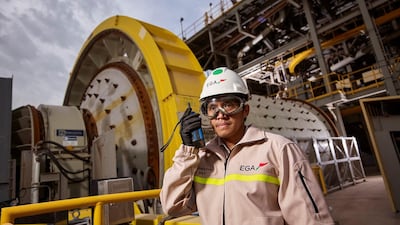Abu Dhabi’s Department of Economic Development outlined investment opportunities in 27 fields to boost local manufacturing of basic consumer and industrial products in a push towards self-sufficiency.
The government is aiming to attract private sector investment in four key basic industries of food production, medical supplies, power generation and important materials such as iron, aluminium and cement, the department told reporters during a virtual press conference on Wednesday.
The government agency highlighted 14 new investment opportunities in medical supplies, including gloves and face shields. Another eight areas in food production targeted range from manufacturing dates to baby foods,turning food waste into animal feed and seed production.
Opportunities in power generation include the manufacture of solar panels and batteries needed for clean energy production and machines for electronic surveillance of power plants.
"Selecting these targetted industries came after detailed analysis in co-ordination with government partner entities based on the amount of consumption of these products and their production rate," said Nabil Saleh Al Awlaqi, the department's environment, health and safety director.
The investment opportunities were identified after studying gaps in the supply chain.
"Through these basic industries we talk about the value chain: how can we complete the value chain with our existing industries, where's our competencies to achieve self-sufficiency?" Khaled Mubarak Banizama, the department's industrial development director, said. "We need to define these gaps and through that we consider the opportunities."
To implement its plan, the government is identifying and engaging key local and global manufacturers to boost production of these goods domestically, Mohamed Ebrahim Al Hosani, Adio's domestic investment director, said.
To attract investors, Abu Dhabi is offering various incentives to manufacturers to stimulate more local production.
This includes a reduction of 10 per cent to more than 30 per cent on electricity tariffs to industrial companies to reduce operational costs, Mr Banizama said.
Details of the investment opportunities emerged after the department said on July 19 it is rolling out a basic industries project aimed at making the emirate "self-sufficient in the production of basic and consumer commodities".
The aim is to increase the private sector's contribution in meeting local demand and encourage exports.
"We hope to attract companies that lead us to a knowledge economy, with the ability for innovation in different sectors," Mr Al Hosani said. "We also want to increase Emiratisation in the private sector."
The project, undertaken by the department’s Industrial Development Bureau, is in partnership with several government entities.
They include the emirate's departments of health and energy, the Agriculture and Food Safety Authority, Abu Dhabi Investment Office, Senaat General Holding and Emirates Global Aluminium.
Food production has become a key focus for the UAE in recent years as it looks to improve its security by encouraging local production and reducing its reliance on exports.
Demand for medical supplies has also skyrocketed during the Covid-19 pandemic and some local manufacturing capacity in the UAE has been converted to meet this need.
Strata, Mubadala Investment Company’s aerospace manufacturing unit, is looking to further diversify into the health technology sector, after producing N95 masks in partnership with Honeywell in May.


